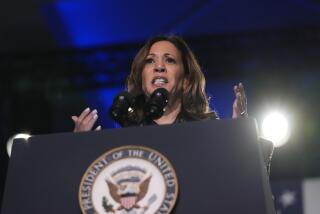Bush in Israel to offer ‘significant nudge’
President Bush said Wednesday that he was trying to “nudge” Israelis and Palestinians to negotiate the outlines of an independent Palestinian state, acknowledging that it has taken the pressure of his first presidential visit to Israel just to get them to the starting line.
But Israeli Prime Minister Ehud Olmert, outlining the conundrum the effort poses, told Bush that it would be “very, very hard to reach any peaceful understanding” until rocket attacks from the Gaza Strip are stopped.
Gaza is controlled by the militant Hamas organization, considered a terrorist group by the United States and Israel. Palestinian Authority President Mahmoud Abbas, whom Bush is to meet with today in the West Bank, has no control over Gaza or Hamas.
Bush, recognizing the difficulty of a mission he wants to see accomplished before he leaves office in barely a year, said the United States stood ready to help but would not take a hands-on role.
“I’m under no illusions,” he said. “It’s going to be hard work. I fully understand that there’s going to be some painful political compromises. . . . I fully understand that there’s going to be some tough negotiations.
“America cannot dictate the terms of what a state will look like.”
Bush said he came here to push both sides toward that goal, saying that Jewish settler outposts in the West Bank “ought to go” and that no part of Palestinian lands can be a “safe haven for terrorists.”
He said that his visit had prompted Abbas and Olmert to agree Tuesday, on the eve of his arrival, to end weeks of delay in tackling the major issues of the decades-old conflict.
“Am I nudging them forward? Well, my trip was a pretty significant nudge,” Bush said.
Bush and Olmert spoke at a news conference in the courtyard of the prime minister’s residence after meeting for more than two hours. Bush issued his strongest warning yet to Iran in the wake of the weekend confrontation between five small Iranian vessels and U.S. Navy ships traversing what the administration said was the open international waters of the Strait of Hormuz.
“There will be serious consequences if they attack our ships, pure and simple,” Bush told reporters. “And my advice to them is, don’t do it.”
Taken together, the challenge of bringing the Israelis and Palestinians together six weeks after making commitments for new talks during a Nov. 27 peace conference in Annapolis, Md., and what Bush described as Iran’s “provocative” behavior, illustrate the difficulty of reducing tensions across the Middle East.
Bush sounded upbeat as Olmert and Israeli President Shimon Peres welcomed him at Ben Gurion International Airport near Tel Aviv after a flight from Washington.
“We see a new opportunity for peace here in the Holy Land, and for freedom across the region,” Bush said.
But Olmert quickly reminded him of the challenge posed by Hamas, an Iran-backed movement that calls for Israel’s destruction. He said there could be no deal with Abbas’ West Bank leadership unless it can curb attacks from Gaza. “Gaza must be a part of the package,” he said.
Palestinian militants fired eight rockets and mortar shells into southern Israel from the coastal enclave during the day, damaging two houses in the border town of Sderot. One resident was treated for shock.
The Israeli military hit back with missiles and ground fire aimed at rocket-launching teams. Palestinian hospital officials said one Hamas-affiliated militant and two civilian bystanders were killed.
Bush said he would ask Abbas what he planned to do about stopping the rockets from Gaza, a part of his prospective state.
Jewish settlements in the West Bank, which Israel captured in the 1967 war, and the Palestinians’ desire for a state pose a similar obstacle to peace talks. Although Olmert has promised to authorize no new settlements and to tear down illegal settler outposts, new outposts continue to crop up, the most recent on the eve of Bush’s arrival.
Bush took note of Israel’s failure to meet its commitment under a 2003 U.S. peace initiative that calls for freezing all settlement activity and dismantling the more than 50 outposts built since March 2001. Settlers have staked out these rural encampments, consisting mostly of trailer homes and containing a few thousand inhabitants in all, with the aim of expanding them and gaining retroactive legal status.
“We’ve been talking about it for four years. The agreement was to get rid of outposts, illegal outposts, and they ought to go,” Bush said.
Bush arrived in Israel to a welcome in parts effusively friendly or querulous.
Olmert gushed praise, giving Bush the type of acceptance he finds at home only in the most partisan of settings. And he used the president’s prestige in Israel to appeal to reluctant partners in his governing coalition to go along with peace talks.
The visit, Olmert said, was “very, very helpful” to the peace process. Ending the news conference, he gave the president at his side a verbal bear hug, telling him: “When I look at you . . . the courage that you have, the determination that you have, and your loyalty to the principles that you believe in, it makes all of us feel that we can also -- in trying to match you, which we can -- we can move forward.”
But an editorial in the Israeli newspaper Maariv complained that Bush was coming with “empty hands.” Sprucing up for the president, the city of Jerusalem spent nearly $400,000 to clean up dusty, pot-holed streets; repair streetlights and repaint graffiti-sprayed walls, city officials said.
The walls of Jerusalem’s Old City are being lighted round the clock during the three-day visit; 1,500 Israeli, American and Jerusalem flags have been hung; and officials said they have deployed 10,500 police officers and security personnel, more than one-third of the national force.
Several thousand people formed a human chain along the Old City walls Tuesday to protest Olmert’s agreement to discuss a possible division of Jerusalem with the Palestinians as part of a peace accord.
In Gaza City, about 5,000 Hamas supporters marched to protest the visit, burning effigies of Bush and Olmert. Some carried posters depicting Bush with fangs, or portraying him drinking through a straw from a cup labeled “Muslim blood.”
Bush, who has visited more than five dozen countries as president, came to Israel in 1998 when he was governor of Texas. This trip is the first presidential visit here since Bill Clinton came in December 1998.
During the eight-day trip, Bush also is scheduled to visit Kuwait, Bahrain, the United Arab Emirates, Saudi Arabia and Egypt.
--
boudreaux@latimes.com
Special correspondent Rushdi abu Alouf in Gaza City contributed to this report.
More to Read
Sign up for Essential California
The most important California stories and recommendations in your inbox every morning.
You may occasionally receive promotional content from the Los Angeles Times.










